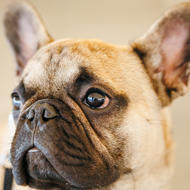Surge in illegal puppy imports feared

"We know that there is an ever increasing demand for certain breeds such as French bulldogs and these breeds are being smuggled into the UK to satisfy this demand."
The Dogs Trust has raised concerns that when Crufts 2016 hits our TV screens this month, it could invite corrupt puppy dealers to exploit increased demand for certain breeds.
Would-be puppy buyers are being urged to do their research, take care to use a responsible breeder and not rush into any impulsive decisions.
As many people tune into this year's Crufts, which kicks off on 10 March, fashionable breeds such as pugs, dachshunds and French bulldogs will be parading across our screens.
The charity says the increasing popularity of these breeds in the UK has led to a dramatic increase in the number of badly bred and unhealthy puppies being illegally imported into the country,
It is already well known that at certain times of the year - notably Christmas - there is a surge in the number of impulsively bought pets. But the Dogs Trust has concerns that seeing 'designer' dog breeds strutting their stuff across the nation's TV screens could prompt backstreet breeders and dealers to capitalise on increased demand by importing more puppies.
"We know that there is an ever increasing demand for certain breeds such as French bulldogs and these breeds are being smuggled into the UK to satisfy this demand," said the charity's veterinary director Paula Boyden. "We understand that when people see such breeds it can result in an impulsive decision to buy one."
Over the past two years the charity has been campaigning to stop the illegal puppy trade which often sees sick, underage puppies being brought to the UK with false papers. It has also stepped in to care for illegally imported puppies seized at ports.
So far, it has cared for over 120 underage 'designer dogs' - which it says were just the tip of the iceberg from the Christmas trade. It is feared that the charity's quarantine kennels will be filled with more by the time Crufts has finished.



 The Veterinary Medicines Directorate (VMD) is inviting applications from veterinary students to attend a one-week extramural studies (EMS) placement in July 2026.
The Veterinary Medicines Directorate (VMD) is inviting applications from veterinary students to attend a one-week extramural studies (EMS) placement in July 2026.